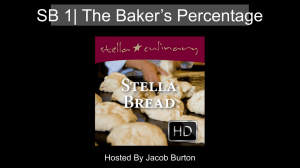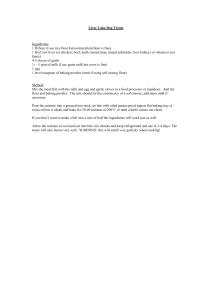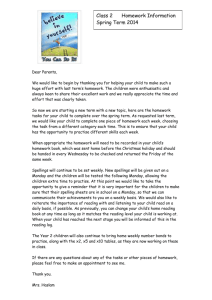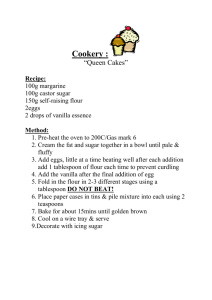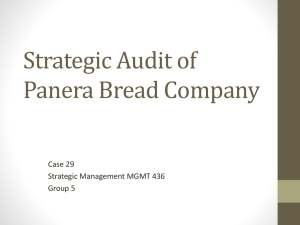Table of Content
advertisement
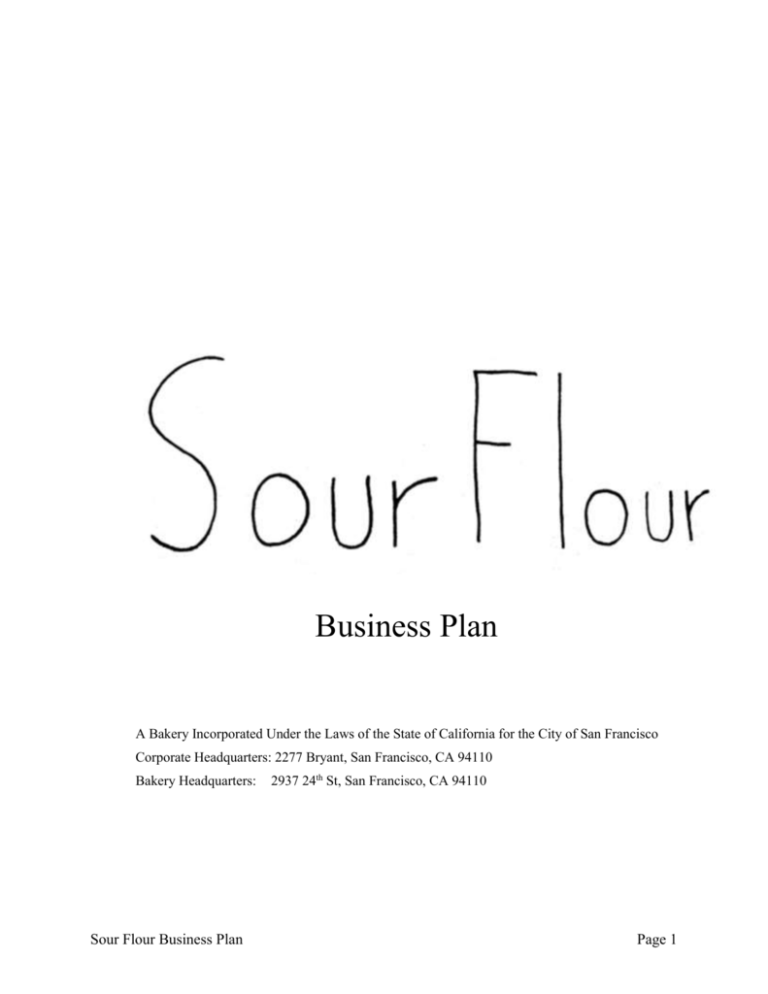
Business Plan A Bakery Incorporated Under the Laws of the State of California for the City of San Francisco Corporate Headquarters: 2277 Bryant, San Francisco, CA 94110 Bakery Headquarters: Sour Flour Business Plan 2937 24th St, San Francisco, CA 94110 Page 1 Table of Contents Executive Summary ........................................................................................................................................................ 3 Business Description ...................................................................................................................................................... 3 Market Strategies ........................................................................................................................................................... 4 Positioning......................................................................................................................................................................... 4 Pricing ................................................................................................................................................................................. 4 Sales .................................................................................................................................................................................... 5 Distribution ....................................................................................................................................................................... 5 Promotion.......................................................................................................................................................................... 5 Competitive Analysis...................................................................................................................................................... 6 Risks ..................................................................................................................................................................................... 7 Operations......................................................................................................................................................................... 7 Financial Pojections ........................................................................................................................................................ 8 Appendix A ........................................................................................................................................................................ 9 Creating Baked Goods ................................................................................................................................................... 9 Baking Process ............................................................................................................................................................... 10 Executive Summary Sour Flour is a bread company in San Francisco. It was created in 2009 with the intent of developing master bakers and producing the highest quality bread. We produce a high quality staple, sell to a loyal customer base, and distribute through a multitude of networks. We bake hand made, naturally fermented bread, and distribute it throughout the city. Our bread is sold to high-end markets, restaurants, offices, schools, and directly to the consumer. Sour Flour is engaged in its community, and is dedicated to educating its consumers and bakers about every aspect of bread. With the past year and a half of business building, Sour Flour is poised to start generating profits within 6 months. By 2013, our projected net sales of $2.6M will generate pretax net profits of 30 percent. In order to achieve our goals, we will be requiring two stages of financing: The first stage of financing will require $25,000 for baking labor, materials, and operational development to reach break-even. The second stage of financing will require $800,000 for the purchase of land and the building of our wood fired oven and attached bakery This Business Plan covers the first stage of operation. To secure initial financing, Sour Flour is seeking a combination of loans and investment. Sour Flour is a Corporation with 1000 shares of stock, which we are selling for $1,000 per unit. We also offer bonds with a 10% annual rate of return, with coupons redeemable quarterly. Sour Flour has developed a unique, high quality Sour Flour Loaf, owns all necessary equipment for the next 4 months, and has already secured a baking facility at La Victoria Bakery. We have been featured in The New York Times Magazine and San Francisco Magazine, and have a wide base of followers and supporters. We have over 100 direct Bread Customers, an established presence at the high-end Bi-Rite Market, and have requests from dozens of businesses to supply bread. Business Description Bread is one of the oldest prepared foods, and it is eaten by almost everyone. Although a majority of bread is mass-produced in factories, the San Francisco Bay Area is the home of the “Bread Revolution”, which has brought back artisan production. For the last 3 decades, bakeries such as Acme, Grace Baking, and La Brea, have grown to represent a significant portion of bread sales. With the growth of the Slow Food Movement, more consumers are moving away from heavily processed “factory bread” towards buying fresh bread. Now in its second year of operation, Sour Flour Corporation is a business based in the bread industry. Our naturally fermented, handmade bread is sold to markets, restaurants, and directly to the consumer. We also teach people how to bake, through our Bread Education program. Sour Flour Business Plan Page 3 Over the past year and a half, we have developed the Sour Flour Loaf, which is our version of basic bread. By using a long, natural fermentation, we develop many flavors, which lack in many of our competitors’ breads. We use high-extraction flour, which is between whole wheat and regular white flour; we get the benefits of more minerals and flavor, while retaining a fluffy loaf. Our bread is hand-made by skilled bakers. Although most bakeries have chosen the route of high technology, we prefer to find efficiencies with our low-tech process. Not too long ago, a typical baker could provide for 250500 people. Instead of replacing bakers with mixers, shapers, and other equipment, Sour Flour encourages the mastering of the baking craft. Considering the largest cost of the bakery is skilled labor, our edge will come from a devotion to improving skill. Investment in Sour Flour will provide funds to pay for oven use, and subsidize the baker’s pay until enough customers are acquired. Although it has been proven throughout history that a baker can create enough bread for his customers while retaining a profit, there is a certain scale that must be reached. Sour Flour has already had tremendous amount of support from its community, including a scholarship to the San Francisco Baking Institute. The founder, Michel Suas, has been instrumental in training most of our inspirational peers: Tartine, Acme, and La Brea. We have been given the opportunity to see the inner workings of many bakeries, including Acme, Brickmaiden, and Arizmendi, and have had help and advice from many bakers. Market Strategies Our direct competitors of most similar bakeries in the Bay Area have total sales of over $50MM. Our target market is limited primarily to San Francisco, with over 800,000 residents, and many more commuters and visitors. With our base in the Mission, our focus will be on the over 74,000 neighbors we have. Our ideal customer consumes two loaves of bread per week, and we could achieve our projected demand in our first year with less than 3% of our neighbors as customers. Positioning The Sour Flour Loaf is full of flavor, and is reminiscent of home baked bread. The loaves are handmade by skilled bakers. Sour Flour is a San Francisco Bakery, and we take pride in our local heritage. We are heavily engaged in our community through Bread Educaion, donations of bread, and collaborations with many businesses in the new food movement. Pricing Throughout Sour Flour’s history, the price per loaf the consumer has paid has always been $4. For the quality of our product, many customers are surprised that we don’t charge more. With loaves of bread costing up to $7 in certain high-end markets, our loaf is relatively affordable. At our primary market, Bi-Rite, we are at the halfway point between the minimum $1.99 and high end $5.99. In order to keep this price for the consumer, we sell loaves to markets for $2.50 and stay within the common markups. Sour Flour Business Plan Page 4 By keeping the cost of a loaf at $4 for home delivery of bread, we offer our customers a deal unmatched by any other bread company. Sales Our primary sales will be to organizations such as markets, restaurants, offices and schools and home customers. The baker is responsible for engaging with the community to setup sales, but we will eventually hire full-time sales agents to continuously find new customers. Our account managers will also be responsible for increasing sales, by reaching out to current customers, and making sure their needs are met. The online systems created by our systems developer will serve to automate much of the sales process, and allow customers to easily make bread requests. Distribution Sour Flour will be distributed through markets, restaurants, offices, and schools. Markets such as Bi-Rite are our starting point, as they provide valuable foot traffic and awareness of our product. Restaurants and sandwich shops will provide additional distribution locations, and also serve to increase brand awareness. For distribution to organizations, we will utilize the couriers to some extent, but will also send the bread directly with the deliveries for La Victoria Bakery. Our costs will be around $.20 per loaf and $.05 per bagel or roll. Our second target for distribution is directly to people in their homes. By getting people to sign up as Bread Customers, we obtain their address, as well as all necessary contact information. By building a custom database, we will be able to efficiently plan daily deliveries based on neighborhood. Distribution directly to the consumer will be done daily by couriers who will receive their route and transportation options. We aim to have a large share of our customers within walking distance of the bakery, but have bikes available for longer distances. In some cases, we the courier may use a car, or the La Victoria Van. Each courier will be able to carry up to 50 loaves per trip, and will be expected to make three trips per day. With customers receiving an average of 1 loaf every 6 days, we can service 900 Bread Customers per courier. The courier would be receiving around $.65 per loaf delivered. Promotion We start with an excellent product at a competitive price, but then make our service exceptional by delivering directly to our customer at no extra cost. In order to get visibility of our offerings, we will use a variety of advertising channels and promotions. Our most effective promotion so far has been through Homerun, a daily deal website. By offering vouchers for half off Bread Education classes, which we run at a profit, we were able to sign up almost 300 new Bread Education Customers in a single day. A side effect of the promotion, which went out to over 40,000 people, was increased visibility of our website, and 60 Bread Customer signups. There are a handful of similar companies we can use to promote our product; Living Social, which has almost 5 times the reach as Homerun, and Groupon, which is the largest in the space. We also have started running ads across Facebook, targeting users who have interests relating to bread and food. We are paying around $.40 for each user who visits our Bread Sour Flour Business Plan Page 5 Customer signup page. As we refine our campaigns, we will look into other advertising options such as Google AdWords, and buying ads directly on food related Websites, targeting users in San Francisco. Sour Flour’s ongoing favorite promotion is Bagel Monday, which is the production and distribution of free bagels. “Start your week off right with Bagel Monday.” This program has a fairly minimal cost, yet provides a very compelling reason for a customer to try Sour Flour. It is also a great loyalty program for our existing customers, considering the general lack of supply of high quality bagels. Our packaging follows our minimalist philosophy. Our bread comes in standard brown paper bags, with Sour Flour written on the bag. We are also developing durable Sour Flour Bags, which customers can use for transporting their loaves. Eventually, Sour Flour customers should have a Bread Box to keep their bread. Sour Flour has already had quite a bit of media attention, with articles in San Francisco Magazine, Mission Local, SF Weekly, and a photo shoot for the New York Times Magazine. As our story unfolds, there is much these news publications can talk about. In order to promote our product in markets, we will provide sample bread, and offer demos to engage with customers. We also participate in food events throughout the city to sample bread and educate our customers. Competitive Analysis The fresh bread industry is a fairly competitive landscape, with over a dozen direct competitors. La Brea Bakery is the largest, with over $100M in sales, sells bread in many of the markets in the Bay Area. Acme Bread, with over $15M in sales, is also in many markets, and has a large amount of restaurant accounts. Similar scale bakeries include Metropolis, Grace Baking, and Semifreddi’s. Firebrand is a smaller operation, but is one of the only bakeries with a wood-fired oven, and is an appealing brand in high-end markets and restaurants. Tartine, considered the best bread in the area, and beyond, sells around 175 loaves a day for $7 each. Josey Baker Bread is an upstart baking company, also in the Mission, sells directly to consumers. Other competitors include neighborhood retail bread companies, such as La Boulange and Arizmendi, as well as in-house bakeries at Safeway, Whole Foods, and Trader Joes. Sour Flour competes against other bakeries in a variety of ways: product quality, production efficiency, and direct distribution. We start with a dedication to mastering bread and improving baking skills. Our product has already reached a level that surpasses many of our competitors, and there are still more improvements which are being developed. We also have been very conscious from the start of developing a hand-made product that can have a scaled up production; our competitors who do compete on quality tend to keep their production minimized, and charge a higher price. Our distribution advantages are primarily against the larger bread companies, which are all based outside of San Francisco. By using custom database systems, we will also be able to effectively distribute our affordable, high quality bread directly to our customers. Sour Flour Business Plan Page 6 We will also retain a competitive advantage within our customer base by engaging with our community. Our Bread Education classes, commitment to baker’s skill over technology such as mixers, customer relations, and general San Francisco dedication make Sour Flour a company with whom people want to form a relationship. Risks The development of our products and customer network involve several potential risks: 1. Lack of funding. As we begin to hire more personnel, and increase our costs, it will be very necessary to monitor funds and progress carefully. We have operated so far on an extremely limited budget, and could continue to do so; the downfall would be that our plans would progress at a far slower pace. As we have already started to receive significant customer signup and payments, we are approaching the point of being more financially solvent. 2. Increased competition. With the current high level of interest in baking bread, there is the potential of new bakeries being created which will compete directly with us for our customers. Fortunately, the quantity of potential customers far exceeds our necessary customer base. There is plenty of room in the market for more bakers. We encourage their entry and would like to collaborate. 3. Increase in the price of wheat. Prices have recently gone up, and may continue to do so. At about 20% of our overall costs, an increase in this ingredient could have significant financial repercussions. All bakers are subject to any increases that might happen in this commodity, so if prices do go up, it also affects all of our competitors. This means that the price of bread may be forced to rise, which would partially decrease demand. However, the demand for bread is fairly inelastic, so the loss would not be as drastic. Furthermore, we always have at our potential the possibility of switching to conventional flour if absolutely necessary. The majority of our competitors use conventional flour, and in doing so they save almost 50% on flour. We prefer to use organic flour, but it is not a critical element of our sales or marketing plan, and could be changed if absolutely necessary. 4. Loss of oven space. The oven is one of the most crucial elements in bread baking. We currently have more than enough space at La Victoria Bakery, and have an excellent relationship with the owner. However, there are other businesses, which operate out of the Bakery, and we could lose critical bake hours. There are other ovens we could use in San Francisco, but it would be a fairly substantial setback in time. By having enough funds to pay our fair share of rent, we mitigate this risk. This risk is one of the reasons for the need to eventually build our own oven. Operations Sour Flour is primarily a baking company, and the crux of the operation is production of bread. The other two critical components are sales and distribution. To reach the scale we intend, it will become necessary to include account management, systems development, administrative, and operational management. Chief Executive Officer: 1 full-time equivalent Sour Flour Business Plan Page 7 Operations Manager: .5 full-time equivalent Baker: 1 full-time equivalent Administrative Assistant: .5 full-time equivalent Sour Flour is a registered corporation, governed by a Board of Directors in compliance with the General Corporation Law of California Financial Projections Sour Flour Business Plan Page 8 Appendix A Creating Baked Goods Sour Flour has spent the last year and a half cultivating our baker’s skills, and developing the unique formula for our main product, the Sour Flour Loaf. Although we have reached a level of quality and consistency our customers are happy with, we will continue to develop our baking skills to further improve the product. We have also developed additional products, such as the Sour Flour Bagel, Sour Flour Rolls, and are working on additional formulas for Sour Flour Ciabatta, Sour Flour Baguettes, Sour Flour Rye, and other types of bread. The steps involved in developing a bread product involve the following: 1. Determine type of flour to use a. Choose from selection from miller b. Milling the flour ourselves i. Choose varietals of wheat ii. Determine proper grinding fineness iii. Determine proper sifting fineness 2. Determine which starter to use a. Establish feeding ratio b. Establish feeding time c. Establish starter hydration d. Adjust as necessary according to temperature 3. Determine formula a. Choose ratio of starter, water, flour, and salt to use b. Establish overall fermentation and proofing times according to given temperatures c. Develop mixing and dough development technique and timing schedule d. Establish baking temperatures, times, and processes 4. Analyze product and make adjustments a. Analyze crust for thickness, crispiness, flakiness b. Analyze crumb for denseness, hole structure, relative proportion to crust c. Taste for flavor of each part, including acidity, sweetness, mouth feel d. Judge overall look of bread based on colors, shape, ear marks, and texture To effectively sell our developed products, we will focus on the following projects: Sour Flour Business Plan Page 9 1. Develop packaging a. Work with designer to improve logo, seal, and bag look b. Work with Rickshaw Bags to create delivery bags 2. Develop marketing materials a. Create shelf talker describing our bread and company b. Create fliers to notify people of home delivery of our products c. Improve website to entice customers to signup 3. Develop distribution system a. Create database to store customer addresses, contact information, and delivery windows b. Create simple online process to order bread, and remind customers as needed c. Create efficient algorithm for deliveries based on distance from bakery, distance from other customers, and time of day 4. Refine sales process a. Survey customers to determine most liked aspects of our product and company b. Develop script for initial phone call or home visit to introduce ourselves c. Create Price List with our different products and rate Baking Process The baking process has been developed over the past millennia, with several improvements in the last few centuries. Our techniques are not new, but we have made them fit our environment and businesses structure. The process is as follows: 1. Feed the starter based on its determined feeding schedule and ratio of flour and water 2. Weigh the appropriate amount of starter based on its activity and the production schedule 3. Weigh the necessary salt, water, and flour to combine with starter 4. Incorporate to reach a homogenous dough, using the appropriate technique based on the hydration and quantity of dough 5. Give the dough a series of rests and dough developing turns, spaced out over its fermentation period 6. Cut and scale dough pieces into their appropriate weight 7. Preshape the loaves, using the appropriate technique, and then let the loaves rest 8. Shape the loaves, and place them onto a flour dusted couch, set on a proofing board Sour Flour Business Plan Page 10 9. Place all proofing boards into a moisture protected rack, and allow the dough to proof for however many hours necessary 10. Unload the loaves using a flip board, and place them on a flour dusted peel 11. Score the loaves using a blade using the appropriate technique 12. Insert the loaves into the oven, followed by enough steam 13. Bake the loaves until crumb is fully set, and crust is appropriately colored and dried 14. Remove loaves and place them on cooling racks 15. Package the loaves for distribution Although many parts of the process can be systematized, a skilled baker is necessary to be able to oversee and complete many of the steps, and to gauge readiness at different stages. As systems are developed to control temperature, timing, and dough handling techniques, many parts of the process will be able to be done by apprentice bakers. Sour Flour Business Plan Page 11
